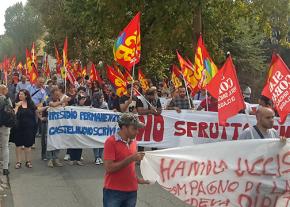Murder on a picket line in Italy
writes from Italy on bitter protests after a killing on the picket line.
SOME 10,000 people marched in the northern Italian city of Piacenza on September 17, as workers across the country raised their voices and took action after a 53-year-old worker was run down and killed by a scab driver while picketing outside a facility run by the package delivery company GLS.
Abd Elsalm Ahmed Eldanf, a father of five who came to Italy from Egypt 12 years ago, was killed on the picket line on September 14.
Ahmed was a member of Unione Sindacale di Base (USB), one of the rank and file-led unions in Italy organized to provide an alternative to the country's big union federations. Formed in 2010, the USB has been active in challenging attempts by package delivery, or logistics, companies to drive down wages and conditions and impose "flexible" labor policies that were accepted by the major union federations several years ago.
After strikes and protests organized by the USB, GLS, one of the biggest logistics companies, was forced to agree in early 2015 to a deal in which it promised to require new subcontractors to take on workers already employed by previous subcontractors. The arrangement spread to other companies in the industry.

But GLS management has been going back on its promise at individual facilities. On September 14, representatives of the USB met with GLS management in Piacenza to demand that the company live up to its previous agreement. When it became clear that GLS bosses had no intention of doing so, USB representatives called on workers gathered at the entrance to the GLS facility to start picketing and block delivery trucks from leaving the depot.
According to one account, the confrontation had been going on for at least an hour when a manager ordered drivers to force their way through the picket line of some 30 workers. One scab drove at the picket line without even slowing down and struck two workers. Ahmed sustained injuries that killed him.
According to Marxist.com, the scab driver has been released, and police have classified the killing as a "traffic accident."
But workers across Italy understand exactly who is to blame for this crime. As word of the death spread, there were spontaneous walkouts in workplaces across the country, and over the weekend, some 10,000 people came from cities and towns across Northern Italy to demand justice for Ahmed.
THE DEATH of Abd Elsalm Ahmed Eldanf is a tragic outcome of three years of escalating violence and repression against workers' struggles in the logistic sector.
The attempt by the delivery companies to drive down wages and conditions has been met by militant and well-organized strikes and protests. But the companies have responded with repression, arrests, violence, and the widespread use of scabs and thugs against workers.
The logistic sector plays a very important role in today's capitalism. In Italy, this sector of the economy has been developing since the 1990s, primarily in the north of the country, in connection with shipping through the ports of Venice and Genoa. Many goods imported from the Middle East and North Africa are distributed through these ports, and IKEA, Amazon and other big companies have set up warehouses in the Po Valley region.
Since the start of the 2007-08 recession and the wave of migration into Europe that followed and has accelerated more recently, the logistics bosses have used the opportunity to drive down wages by more than half, while raising productivity.
The use of subcontractor cooperatives has been central to the employers' strategy, and some companies have been known to use Mafia gangs. Today, 90 percent of warehouse workers in Northern Italy are migrants from Africa, the Middle East and South America, as well as less prosperous countries in Eastern Europe.
But from 2010 to 2013, the rapid development of so-called "base unions" like the USB and Sindacato Intercategoriale Cobas--thanks in many cases to the efforts of left-wing activists--has led to a series of struggles that have won tangible victories in terms of wages and conditions.
These battles are continuing on a larger scale today and provide an important example of the potential for an alternative to the retreat of the left and social movements in Italy.
The importance of connecting these experiences of struggle at the international level is obvious in order to bring together workers and their organizations across Europe, North America and the rest of the world. The class struggle has become international, and so the workers of the logistics industry must organize worldwide.


